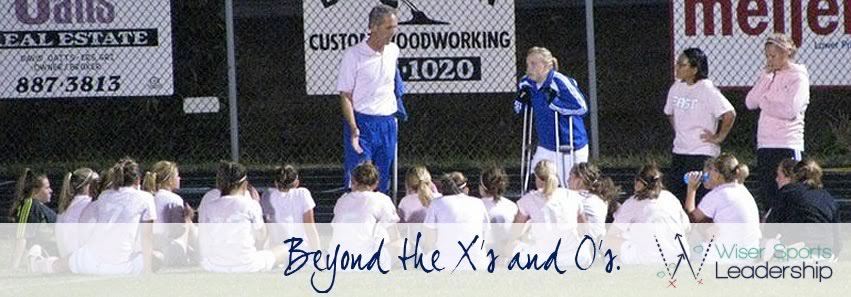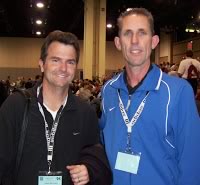THE COLD MOMENTS OF COACHING……WHERE WILL YOU TURN?
Often we learn of high profile coaches who step away from their respective sports. It seems surprising and makes us wonder why these successful coaches didn’t want to continue a career they obviously loved.
Is there a common thread? Could the issue or challenge be alleviated, or relieved in part? How many other coaches in club, high school or college step away unnoticed due to suffering from the same condition?
Coaching can be a stressful career, and it requires wearing many hats. The variety of demands is one of the allures of the job because it presents us challenges to solve and keeps every day fresh and new. Here are a few of those hats.
Visible Leader– In the spotlight at school, the community and during press conferences. Being the leader of a team and patrolling the sidelines fuels that ego.
Strategist/Planner– Moving the X’s and O’s to our advantage during a game while matching wits with an opposing coach is stimulating and it allows us a plan to lead our team to success.
Counselor– Many challenges throughout the year on and off the field have little to do with our game, but have everything to do with the mental state of our players. Knowing and understanding this means the difference in success and failure.
Enforcer– Stepping in when needed to hold ourselves, our staff and our players accountable. Our actions must match our words regardless of who is involved.
Parent– In a parent-like way, we are delighted to we see our players succeed, are there when times are tough and have to be totally honest as well.
Rock– That stoic and solid persona in the darkest of times after a big time loss, a parent issue, or a player does something out of character. Often the rock prefers to carry the load locked inside with no help from anyone.
Let’s focus on the “Rock.” What situations require and take so much of us?
Big loss against a team you’re supposed to beat.
Losing in the post season when expectations are high.
Player breaking a school or team rule.
Heated parental confrontation
Losing control in a game and getting ejected.
Player(s) who are self centered and care little about the team.
Athletic Director or Administrator who does little to support your team.
Newspaper or reporter who blasts your team regularly, or ignores it.
Facilities that are sub par and in disrepair.
We could name more, but I’m certain you’d agree these are tough to deal with. Granted some are in your control, and others can be dealt with in an appropriate manner. But will they leave scars? Will they heal quickly, or might you drag them around for a long time?
Many veteran coaches will tell you, “You can’t be thin skinned and do this job.” What exactly does that mean? If you’ve put your heart and soul into your team and your program, some situations are going to sting from time to time. Telling me I’m thin skinned doesn’t approach how I should handle the after effect of these situations.
Dealing with these challenges all alone can be the dark side of coaching. Those times in a career when something gets to the very core of who we are. It’s an area that isn’t talked about in coaching classes. Yes, the challenges are listed and some solutions are given, but no discussion about how to deal with absorbing it and taking this part of the job home with you every night.
As coaches we often hold some things in, never share the distress and blame, figuring it’s our fault and just wait for time to slowly pass so we can get over them. Is that the best way? Surely not.
So how can we deal with these challenges allowing us to move forward?
Mentor/Coaching Peer– Talking about the issue is usually a good first step. Share it with someone you trust who may have been in the same situation in their career. Just knowing that you’re not the first coach to deal with this challenge, and the fact that you’re not alone in carrying this burden can be a relief.
Athletic Director- If the load of the job is wearing you down, talk to your AD about delegating some of the responsibility and how best to prioritize the tasks required every day. AD’s are experienced in these situations and can remind you that you’re not in this alone. They want you to succeed and be at your best mentally for your student athletes.
Parent/Player/Reporter/Team- If someone has upset you, set up a meeting with them and do your best to resolve the issue. They may not know what they’ve done, and if you were wrong, admit it. They need to know how you view the best way to move forward. Even if you don’t resolve the issue you’ll feel better for making the attempt.
Husband/Wife/Partner- Talk about the challenges of the day with those at home. While they may or may not understand every detail, just by sharing your feelings you will have released some of the stress of the day. Plus you may be surprised at their insight of how best to handle a situation and move forward. Keep in mind they care about you most.
24-Hour Rule- Wait 24 hours regardless of the situation before you act. If only someone had shared that with me. After a devastating loss I was totally washed out. After tossing all night long, I made the decision to resign the next morning figuring the loss was totally my fault. I didn’t even tell my wife. My team gathered in a classroom and after telling them I had let them down, I shared my decision. The look in their eyes was utter astonishment. What I failed to realize was the loss was devastating to them as well, and now in a selfish act I had hurt them even more. During the day I got a couple of heartfelt letters from players asking me to reconsider, as well as phone calls from several parents. My wife’s voice of reason, after learning what I had done, was the final assurance I needed to stay on. I am deeply indebted to players, parents and my wife for helping me see the truth. Had I shared my thoughts and feelings early I feel certain I wouldn’t have resigned in the first place.
Carrying a weight like this is tough, and many coaches are often unwilling to share because they think it’s a sign of weakness. It’s quite the opposite. By sharing we show our strength to work through challenges and unload a burden that hinders us from being at our best for ourselves, our family and our players.
If you’ve faced these coaching challenges alone, you aren’t the first to keep everything locked inside, and you won’t be the last. Just know it’s a great feeling when you let it go by sharing it with those who can help.
I wish you and your team the best!


 The losses will linger, and wake you up at night. The wins leave like the wind.
The losses will linger, and wake you up at night. The wins leave like the wind. Seeing your players other talents on a talent show night! So much fun!
Seeing your players other talents on a talent show night! So much fun! I hope so, because it’s one of the most rewarding careers in the world. The joy of helping young people succeed on and off the field is something you can’t put a price on. So much of coaching has nothing to do with technique, tactics, conditioning, etc. but comes down to communication, caring, responsibility, understanding, and the ability to not be distracted by those who are not in your corner. We as coaches must always do what’s best for our players, and as the games begin, what’s best for our team.
I hope so, because it’s one of the most rewarding careers in the world. The joy of helping young people succeed on and off the field is something you can’t put a price on. So much of coaching has nothing to do with technique, tactics, conditioning, etc. but comes down to communication, caring, responsibility, understanding, and the ability to not be distracted by those who are not in your corner. We as coaches must always do what’s best for our players, and as the games begin, what’s best for our team.